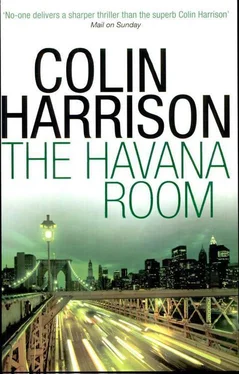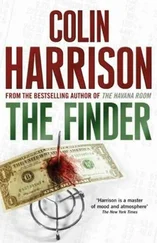Colin Harrison - The Havana Room
Здесь есть возможность читать онлайн «Colin Harrison - The Havana Room» весь текст электронной книги совершенно бесплатно (целиком полную версию без сокращений). В некоторых случаях можно слушать аудио, скачать через торрент в формате fb2 и присутствует краткое содержание. Жанр: Триллер, на английском языке. Описание произведения, (предисловие) а так же отзывы посетителей доступны на портале библиотеки ЛибКат.
- Название:The Havana Room
- Автор:
- Жанр:
- Год:неизвестен
- ISBN:нет данных
- Рейтинг книги:5 / 5. Голосов: 1
-
Избранное:Добавить в избранное
- Отзывы:
-
Ваша оценка:
- 100
- 1
- 2
- 3
- 4
- 5
The Havana Room: краткое содержание, описание и аннотация
Предлагаем к чтению аннотацию, описание, краткое содержание или предисловие (зависит от того, что написал сам автор книги «The Havana Room»). Если вы не нашли необходимую информацию о книге — напишите в комментариях, мы постараемся отыскать её.
The Havana Room — читать онлайн бесплатно полную книгу (весь текст) целиком
Ниже представлен текст книги, разбитый по страницам. Система сохранения места последней прочитанной страницы, позволяет с удобством читать онлайн бесплатно книгу «The Havana Room», без необходимости каждый раз заново искать на чём Вы остановились. Поставьте закладку, и сможете в любой момент перейти на страницу, на которой закончили чтение.
Интервал:
Закладка:
myself, and stepped straight to the answering machine. Keeping on my glove, I pressed PLAY.
"Listen, you peckerass!" boomed Poppy's voice through a squall of static, "just pay these guys some fucking blood money, all right? Herschel's family, somebody working for them, are here. They're here! Right here, okay? Found me at the diner this afternoon. Did you tell them I eat there? I don't get it, Jay. They got me. They're listening to every word I'm telling you right now. Said they knew something about Herschel, I said I didn't know what. I said okay I called in the ambulance but he was already dead. They think we killed him! They're not going to the police, either. That's what they say, anyway, what-?" The voice became indistinct. "Yeah, they got- I mean, I told them your phone number, Jay, and where your girlfriend at the steakhouse works, okay? I got to give them something, that's all I got to give, and I don't know what else to say. I told them that's all I know. Just pay them, Jay, just-"
That was it. End of message. My fingers trembled, but I hit the memory button for old messages. Nothing. Time to go. But I didn't. I did one more thing; I dialed my new cell phone from Jay's phone. His number popped up on the display, and I saved it.
This done, I shot out of the room, pulled the door behind me, and scooted down the stairs. I kept my cap low and turned downhill on the street. Had anyone seen me? I caught a getaway taxi on Third Avenue, and the driver flicked on some kind of Indian or Bangladeshi stand-up comedy show. Urmatta-eshi-ohvalindi-halaloo, came a man's voice. Heh-heh, came the response. Durmeshala-burmatta-valnahnah-galod-pulurshindaloo! And then, Heh-heh.
I settled into my seat- Brooklyn to midtown Manhattan would take a while. I didn't want to keep thinking of Jay as an adversary, for clearly he was living under desperate circumstances, to a degree I hadn't realized before. But that same desperation worried me; a man who needs oxygen tanks at night is not as scared of lawsuits and other threat sas is another man. It was also true that my illegal entry of Jay's premises hadn't resulted in any information that would help me deal with Marceno. What, then, had I learned? H.J.'s men were threatening Poppy. I needed to tell Allison to watch out, didn't I? And Jay, involved with Sally Cowles, was trying to draft a strange letter to her father. Had he bought the Reade Street building for some reason involving them? What else? The cartilage in his ear was related to the problem. He had a refrigerator full of black-market pharmaceuticals. He was obsessed with someone or something named FEV.
I leaned across the taxi's partition. The driver glanced in his rearview. "Take me to the New York Public Library," I said.
Varanasi-amattagobi-halapur-geshura-nanaloo!
Heh-heh.
Two hours later I knew that the air humans breathe at sea level is about twenty-one percent oxygen. In polluted American cities such as New York and Los Angeles and Tokyo, the concentration can fall to eighteen percent. Man breathes in about eighteen cubic feet of air per hour, drawing the stuff deep into the sacs of the lungs, making his red blood cells glow as oxygen hits them, and, like a tree or a dog or a worm, returns carbon dioxide into the atmosphere. Fully a fifth of the oxygen we breathe is consumed by the brain. Not only do we need the stuff, we're made of it: sixty-two percent, by body weight. The lungs grow steadily in children, then quite rapidly during puberty, but also continue to grow after maximum height has been reached. In males, lung capacity may continue to increase up to the age of twenty-five. The greatest variable in maximum lung capacity is, as would be expected, the size of the person, and Jay's theoretical maximum lung capacity was probably about 680 milliliters. But in healthy people the limits of exertion are dictated by the limits of the circulation system, not by the lungs. This is why shorter people can outrun taller people and why Olympic athletes often train at high altitudes to increase their red blood cell concentrations and return to low altitude just prior to competition. For all people, however, lung capacity begins to fall after age thirty. The ability to absorb oxygen is, in fact, one of the medical definitions of aging. The downward curve in our capacity is slow, however, and, in the absence of disease, is usually gentle enough to carry a human being far into old age.
There was more. FEV, the thing Jay wanted so badly not to be obsessed with, stood for forced expiratory volume and was the ratio of an individual's lung capacity to his or her expected healthy lung capacity, given height, age, and sex. A normal FEV score is 85 or higher. The morbid effects of disease can be seen in a low FEV score. The average decline in FEV of long-term smokers, for example, when plotted against non-smokers, is quite dramatic. A heavy smoker in his fifties has often lost so much lung capacity that he or she has reached an FEV rating of 45 or 50, a score that a healthy nonsmoker would not reach until age one hundred, were he to live that long. But slowly smoking a mountain of beautifully poisonous cigarettes is not the only thing that causes a low FEV. Other causes include organic diseases such as severe asthma, cystic fibrosis, pulmonary fibrosis, and environmental irritants, including air pollution, asbestos, and exposure to toxins. These conditions can cause permanent loss of FEV by damaging the elasticity of the lungs and their ability to receive oxygen. They can also cause a reversible, mechanical loss of FEV by simply irritating the bronchial tubes, which both reduces the air that can get into the lungs and causes intense mucus secretion. Judging from the contents of his refrigerator, Jay was doing everything the books mentioned to marginally increase his breathing ability, dosing himself with steroids, bronchial dilators, and whatever else might increase his uptake and utilization of oxygen. His color, I reflected, was usually pretty good, which suggested his self-medication was successful. The inhalers, I read, reduced the sensitivity of lung tissue, and the prednisone actually shrank the tissue. Did he use these drugs constantly or just for intervention when his FEV was dropping? Put differently, what was his unmedicated capacity? That, I suspected, was pretty low- because of the enormous amount of oxygen Jay was using. An FEV below 60, in itself a very bad sign, requires supplemental inhaled oxygen, at least intermittently, and inhaled oxygen, as Jay no doubt knew, is a deal with the devil.
The more often you use inhaled oxygen, the longer you survive. People with low FEV scores on twenty-four-hour oxygen supplementation live longer than do people with the same FEV using oxygen only fifteen hours, and they in turn live longer than people using it only ten hours. And so on. But the more often one uses supplemental oxygen, the more addicted the body becomes to it, and the more constricted one's life. Clearly Jay was trying to avoid using the stuff, even in moments of high exertion- such as swinging a baseball bat, an activity that no doubt gave him pleasure and release and a sense of his former talents. This explained, perhaps, the shortness of his visits to Allison's apartment. It also begged the question of how he had sex with her. Swinging a baseball bat is a lot less rigorous than sex. Did Jay have on an oxygen mask when he was plugging Allison? That seemed unlikely. Freaky and sick, but unlikely. I kept reading. Jay probably needed a backup source of oxygen, and I wondered if the device in the rear of his truck that he used the night we moved the bulldozer might be what the books called an oxygen concentrator, a relatively inexpensive device that pulls oxygen from the atmosphere and stores it.
Because oxygen uptake tends to decrease at night, especially during REM sleep, he was probably using the oxygen tanks mostly then. The hyperbolic chamber, I learned, is used to saturate the tissues of the body with as much oxygen as possible. Its effectiveness occurs in the outer margins of measurable oxygen uptake but it does help prevent certain kinds of infection and stiffening of tissues. Jay was doing everything he could. But no matter what, the books said, FEV keeps dropping, and once it falls below a score of 11, then death is imminent. No wonder Jay was trying not to be obsessed with it.
Читать дальшеИнтервал:
Закладка:
Похожие книги на «The Havana Room»
Представляем Вашему вниманию похожие книги на «The Havana Room» списком для выбора. Мы отобрали схожую по названию и смыслу литературу в надежде предоставить читателям больше вариантов отыскать новые, интересные, ещё непрочитанные произведения.
Обсуждение, отзывы о книге «The Havana Room» и просто собственные мнения читателей. Оставьте ваши комментарии, напишите, что Вы думаете о произведении, его смысле или главных героях. Укажите что конкретно понравилось, а что нет, и почему Вы так считаете.












